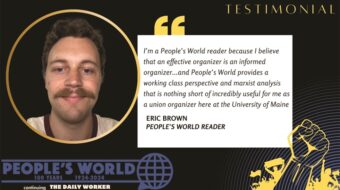WASHINGTON (PAI)–Union leaders and a labor economist whose university has spent eight years studying the airline industry are warning of turbulence ahead I Atlanta-based Delta Airlines swallows Minnesota-based Northwest.
In the third hearing on the proposed deal before various congressional committees, Machinists Vice President Robert Roach warned the deal could lead to $15 billion in combined pension liabilities being dumped on the federal government.
And Association of Flight Attendants-CWA President Pat Friend said Delta’s management—which Roach said refuses to talk to IAM—has already told AFA that it wants the “new Delta”ン to be totally non-union.
That’s because the merged airline would become the nation’s largest and would set the standard for others in a race that would eliminate the remaining well-paying jobs in the airline industry, she added.
Roach and Friend were two witnesses at the July 31 House Education and Labor Subcommittee hearing on the deal, which Delta wants to push through by the end of the year, before the anti-worker GOP Bush regime leaves office. The deal needs Bush Justice Department approval on anti-trust grounds. Unless Congress specifically enacts a ban on using federal funds in deciding the case, there is little lawmakers can do.
But that didn’t stop the two union leaders, nor MIT labor economist Thomas Kochan, from warning of potential dire consequences to the workers, the airlines, and the communities they serve.
Kochan’s one caveat was that if the merger is done right — with the two carriers working in cooperation with their unions — disaster of slumping wages, disappearing pensions and declining service quality could be avoided. He recommended the airlines reach out to the other unions about the merger’s impact, just as they have with the Air Line Pilots at both carriers, where the two sides reached pre-merger agreements.
The Machinists and the Flight Attendants are the two largest unions at Northwest, which is virtually wall-to-wall union. IAM represents ramp agents, ground agents and other personnel, while a non-AFL-CIO union — AMFA — represents its machinists. The pilots are the only union group at Delta and one of them at Northwest.
AFA represents Northwest’s flight attendants, and recently lost a second election at Delta after a vicious anti-union campaign there which persuaded a majority of its flight attendants not to cast ballots.
Under the separate federal law that governs labor-management relations at airlines and railroads, the union must win and 50% plus of all potential unit members must vote. An unreturned ballot is counted as a “no.” In the May 28 tally at Delta, AFA-CWA got 39.2%, other unions got 0.8% — but 60% of Delta flight attendants, influenced by the airline’s campaign, didn’t vote, so the union lost.
Friend forecast Delta’s management would try to oust the union, with a new vote — which the law allows — when the merger goes through and Delta’s and Northwest’s flight attendants all cast ballots (or don’t) on whether to have the union or not.
If AFA-CWA is ousted at Northwest after Delta takes over, the flight attendants there could see their pay cut, their benefits slashed, and their pensions gone, she said.
The peril to pensions was Roach’s main theme. He traced the history of prior airline mergers, saying that in only one case, Continental, did management reverse course and talk with the unions to smooth things over. At other carriers, including United and US Air — and, when they were bankrupt, Northwest and Delta — the carriers dumped pension liabilities on the federal Pension Benefits Guaranty Corp., he noted.
Management witnesses told lawmakers that wouldn’t happen with this merger, because it would leave the combined airline financially healthy, they claimed. They also reiterated that “no front-line employees” would be laid off due to the merger.
The Delta official, however, dodged one lawmaker’s question about the company’s announcement that should the merger go through, some 3,500-4,000 Northwest clerical personnel and reservations agents would not lose their jobs, but might be forced to move from the Twin Cities to Atlanta to keep them.
His aide also forced him to refuse to answer a reporter’s question later about the sequence of events that first led to the Delta ALPA Master Executive Council reaching a pre-merger pact with management, followed by one with the Northwest ALPA MEC. At prior hearings, before that pact was reached, Delta Council Capt. Lee Moak testified for the merger, while his Minnesota counterpart opposed it.
Neither ALPA MEC testified or submitted a statement for the latest hearing. But Kochan held up those two pacts with the pilots as examples of what could go right, if the airlines sincerely bargained with their workers. If they did not, things could go very wrong, he added.
Roach said it was likely they would. Though Northwest has been unionized for years, he noted, its labor relations have been among the worst in the airline industry. And management isn’t really paying attention to the pension issue or the impact of the merger upon the workers, he said.











Comments